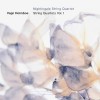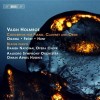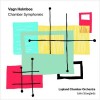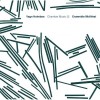Composers
Vagn Gylding Holmboe (Danish pronunciation: [vɑwn ˈhʌlmboːˀ], 20 December 1909 in Horsens, Jutland – 1 September 1996 in Ramløse) was a Danish composer and teacher who wrote largely in a neo-classical style (Rapoport 2001).
Vagn Holmboe was born into a merchant family of dedicated amateur musicians. Both parents played the piano. His father earned his living as a maker of colours and lacquers at Horsens.[1] The Danish journalist Knud Holmboe was his elder brother.
From the age of 14 Vagn Holmboe took violin lessons. In 1926, at the age of 16, he began formal music training at the Royal Danish Academy of Music in Copenhagen on the recommendation of Carl Nielsen. He studied under Knud Jeppesen (theory) and Finn Høffding (composition).
After finishing his studies in 1929 he moved to Berlin where for a short period Ernst Toch became his teacher (Rapoport 2001). During his time in the German capital he met the Romanian-born pianist and visual artist Meta May Graf (1910-2003) from Sibiu/Hermannstadt. She had studied at the Musikhochschule Berlin since 1929, with Paul Hindemith as one of her teachers.[2] The couple married in 1933 and left Berlin for Romania, where they visited obscure and remote villages and studied Transylvanian folk-song.[3] Subsequently, they moved to Denmark, settling in the capital, Copenhagen, in 1934. While his wife Meta gave up her musical career to pursue her passions in the visual arts, photography in particular, Vagn gave music lessons privately and began composing during this period. Many of the early compositions have never been performed. Similar to the research he had already done in Romania, he pursued his studies of folk-song with much field-work throughout Denmark including the Faroes and Greenland. Many overtly folk-linked compositions, including the Inuit Songs, are a result of these activities.
From 1941 to 1949 he was a teacher at the Royal Institute for the Blind, and from 1950 to 1965 he taught at the Royal Conservatory in Copenhagen, being appointed a Professor there in 1955. Prior to that he had also worked as a music critic for the Danish daily Politiken from 1947 to 1955.[4]
Vagn Holmboe's students included Per Nørgård, Ib Nørholm, Bent Lorentzen, Arne Nordheim, Egil Hovland and Alan Stout. See: List of music students by teacher: G to J#Vagn Holmboe.
Vagn and his wife Meta had bought a piece of land at Lake Arresø in Ramløse/Zealand in 1940, where they set up a farm, "Arre Boreale" (Latin for Northern Arresø), in the 1950s and spent the rest of their lives together there.[5] Vagn Holmboe was a keen nature-lover, who lived in the countryside until his death in 1996 and over the years personally planted 3000 trees on his land.
Recently Added
| Country: | Denmark |
| Period: | Contemporary classical music |
Biography
Vagn Gylding Holmboe (Danish pronunciation: [vɑwn ˈhʌlmboːˀ], 20 December 1909 in Horsens, Jutland – 1 September 1996 in Ramløse) was a Danish composer and teacher who wrote largely in a neo-classical style (Rapoport 2001).
Vagn Holmboe was born into a merchant family of dedicated amateur musicians. Both parents played the piano. His father earned his living as a maker of colours and lacquers at Horsens.[1] The Danish journalist Knud Holmboe was his elder brother.
From the age of 14 Vagn Holmboe took violin lessons. In 1926, at the age of 16, he began formal music training at the Royal Danish Academy of Music in Copenhagen on the recommendation of Carl Nielsen. He studied under Knud Jeppesen (theory) and Finn Høffding (composition).
After finishing his studies in 1929 he moved to Berlin where for a short period Ernst Toch became his teacher (Rapoport 2001). During his time in the German capital he met the Romanian-born pianist and visual artist Meta May Graf (1910-2003) from Sibiu/Hermannstadt. She had studied at the Musikhochschule Berlin since 1929, with Paul Hindemith as one of her teachers.[2] The couple married in 1933 and left Berlin for Romania, where they visited obscure and remote villages and studied Transylvanian folk-song.[3] Subsequently, they moved to Denmark, settling in the capital, Copenhagen, in 1934. While his wife Meta gave up her musical career to pursue her passions in the visual arts, photography in particular, Vagn gave music lessons privately and began composing during this period. Many of the early compositions have never been performed. Similar to the research he had already done in Romania, he pursued his studies of folk-song with much field-work throughout Denmark including the Faroes and Greenland. Many overtly folk-linked compositions, including the Inuit Songs, are a result of these activities.
From 1941 to 1949 he was a teacher at the Royal Institute for the Blind, and from 1950 to 1965 he taught at the Royal Conservatory in Copenhagen, being appointed a Professor there in 1955. Prior to that he had also worked as a music critic for the Danish daily Politiken from 1947 to 1955.[4]
Vagn Holmboe's students included Per Nørgård, Ib Nørholm, Bent Lorentzen, Arne Nordheim, Egil Hovland and Alan Stout. See: List of music students by teacher: G to J#Vagn Holmboe.
Vagn and his wife Meta had bought a piece of land at Lake Arresø in Ramløse/Zealand in 1940, where they set up a farm, "Arre Boreale" (Latin for Northern Arresø), in the 1950s and spent the rest of their lives together there.[5] Vagn Holmboe was a keen nature-lover, who lived in the countryside until his death in 1996 and over the years personally planted 3000 trees on his land.






